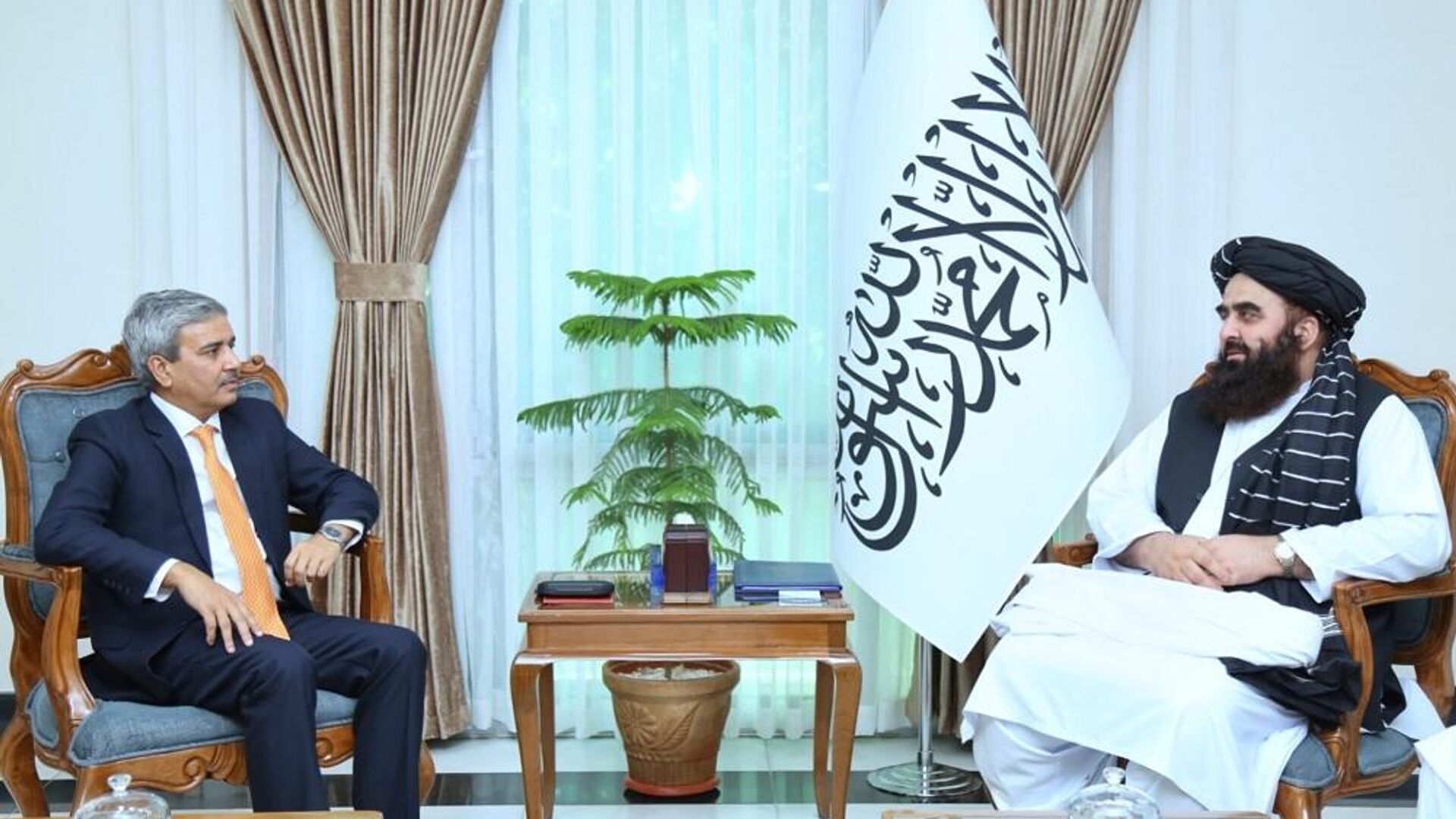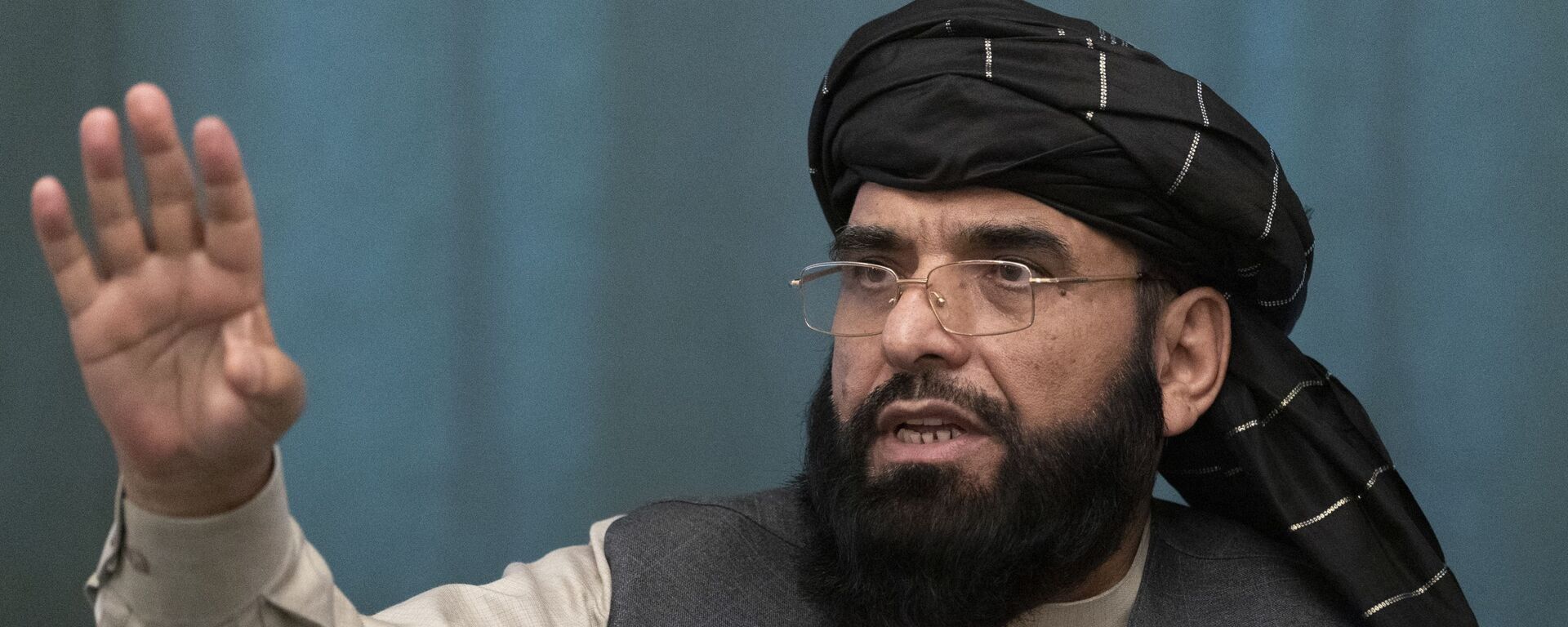https://sputniknews.in/20241110/what-does-indias-engagement-with-the-taliban-mean-for-south-asia--8378501.html
What Does India's Engagement With the Taliban Mean for South Asia?
What Does India's Engagement With the Taliban Mean for South Asia?
Sputnik India
India's official engagement with the Taliban* government is being seen as a significant breakthrough from ongoing investment projects given the uncertainty that shrouded the future of its ties with Kabul since the chaotic US withdrawal from Afghanistan in August 2021, experts have said.
2024-11-10T19:10+0530
2024-11-10T19:10+0530
2024-11-12T18:48+0530
sputnik opinion
india
afghanistan
us
taliban
the united nations (un)
humanitarian aid
kabul
delhi
new delhi
https://cdn1.img.sputniknews.in/img/07e8/0b/08/8375977_0:20:1000:583_1920x0_80_0_0_276c52920ad7e6c0dbc79e0cce2102c9.jpg
India's official engagement with the Taliban* government is being seen as a significant breakthrough from ongoing investment projects given the uncertainty that shrouded the future of its ties with Kabul since the chaotic US withdrawal from Afghanistan in August 2021, experts have said. She stressed that India remains the largest regional donor to Afghanistan, contributing help to the tune of $3 billion.With the return of the Taliban, India kept to its cautious approach for a while and waited for a favourable opportunity to engage. Once in power, the Taliban were also eager to uphold interaction with New Delhi as they fully understood the importance of the ongoing infrastructure and development projects helmed by India, Singh reminded.She pointed out that India's strategic patience has worked well as it waited out for the reality to sink in on the Taliban side. They are now more pragmatic. There are a few signs of reduced religious dogmatism as well. Additionally, the Taliban is in search of recognition and funds to manage the country, Singh contended.She opined that the Taliban realise fully that countries like Pakistan could cater to its short-term strategic objectives vis-a-vis the US or the Afghan regimes. But as far as development and progress are concerned, no one can match India. Singh suggested that India is a regional partner that has quietly but generously contributed to Afghanistan's reconstruction. India is willing to continue the same friendly approach at a time when big powers like the US have chosen to withdraw funds, while any help from the Chinese side has been suboptimal. At this point, the Taliban is looking for reliable, long-term, sustainable partnerships, which only India seems to be seriously willing to offer, she asserted.Meanwhile, Dr. Shalini Chawla, a distinguished fellow at the Centre for Air Power Studies (CAPS) believes that the recent talks are a continuation of India's commitment to the Afghan people and that New Delhi intends to continue to extend humanitarian assistance to Kabul. She explained that India has been keen to address the instability in Afghanistan and safeguard its security and strategic interests, ensuring that Afghan soil is not used by anti-India terror groups.On the other hand, Siar Khoreishi, an Afghan pundit of global politics, observed that the Taliban-led government's growing cooperation with India could bring several strategic and economic benefits, despite the complex diplomatic landscape. Areas the Taliban could benefit from Indian assistance are: * under UN sanctions for terrorism
https://sputniknews.in/20241107/taliban-hopes-better-ties-with-us-may-lead-to-recognition-of-authorities-official-8373469.html
india
afghanistan
us
kabul
delhi
new delhi
south asia
Sputnik India
feedback.hindi@sputniknews.com
+74956456601
MIA „Rossiya Segodnya“
2024
Pawan Atri
https://cdn1.img.sputniknews.in/img/07e6/0c/13/139630_147:0:831:684_100x100_80_0_0_8fa2b25903e7787fe6a2698552c167df.png
Pawan Atri
https://cdn1.img.sputniknews.in/img/07e6/0c/13/139630_147:0:831:684_100x100_80_0_0_8fa2b25903e7787fe6a2698552c167df.png
News
en_IN
Sputnik India
feedback.hindi@sputniknews.com
+74956456601
MIA „Rossiya Segodnya“
Sputnik India
feedback.hindi@sputniknews.com
+74956456601
MIA „Rossiya Segodnya“
Pawan Atri
https://cdn1.img.sputniknews.in/img/07e6/0c/13/139630_147:0:831:684_100x100_80_0_0_8fa2b25903e7787fe6a2698552c167df.png
india, afghanistan, us, taliban, the united nations (un), humanitarian aid, kabul, delhi, new delhi, south asia, terrorism
india, afghanistan, us, taliban, the united nations (un), humanitarian aid, kabul, delhi, new delhi, south asia, terrorism
What Does India's Engagement With the Taliban Mean for South Asia?
19:10 10.11.2024 (Updated: 18:48 12.11.2024) Unlike with the previous Taliban regime, India has opened channels of dialogue with Kabul's current rulers since the hardline Islamic movement swept back to power in August 2021 following the withdrawal of US forces.
India's official engagement with the Taliban* government is being seen as a significant breakthrough from ongoing investment projects given the uncertainty that shrouded the future of its ties with Kabul since the chaotic US withdrawal from Afghanistan in August 2021, experts have said.
"The meetings held by the Indian delegation with Afghanistan interim Defence Minister Mullah Mohammad Yaqoob have been extremely productive in terms of India not only inviting Afghanistan to utilize the just-completed Chabahar Port for its trade needs but also discussions over aid and assistance. The delegation also met former President Hamid Karzai and UN representatives. This shows India's multipronged initiative while on-setting its official talks with the Taliban government," Dr. Priyanka Singh, an associate fellow at the New Delhi-based Manohar Parrikar Institute for Defence Studies and Analyses (MP-IDSA), told Sputnik India.
She stressed that India remains the largest regional donor to Afghanistan, contributing help to the tune of $3 billion.
With the return of the Taliban, India kept to its cautious approach for a while and waited for a favourable opportunity to engage. Once in power, the Taliban
were also eager to uphold interaction with New Delhi as they fully understood the importance of the ongoing infrastructure and development projects helmed by India, Singh reminded.
"The situation today looks in stark contrast to 2021- India's position looked extremely weakened - its diplomatic mission ceased to operate and people were evacuated in an emergency. India's vexations also stemmed from the reality of Pakistan's overbearing prominence in controlling the Taliban's state of affairs. The group as it swept power rendered all institutions of the previous regime redundant," the strategic affairs analyst highlighted.
She pointed out that India's strategic patience has worked well as it waited out for the reality to sink in on the Taliban side.
They are now more pragmatic. There are a few signs of reduced religious dogmatism as well. Additionally, the Taliban is in search of recognition and funds to manage the country, Singh contended.
"For years India invested towards ensuring the well-being of the Afghan people. Today, India has pitched in yet again and the road to resurrect and maintain its foothold/strategic niche in Afghanistan is now wide open. From here on, India and Afghanistan can sit [down] and work on multiple issues of security and development cooperation, enhancement of trade opportunities, humanitarian assistance, and restore and strengthen more and more cultural exchanges," the expert noted.
She opined that the Taliban realise fully that countries like Pakistan could cater to its short-term strategic objectives vis-a-vis the US or the Afghan regimes. But as far as development and progress are concerned, no one can match India.
Singh suggested that India is a regional partner that has quietly but generously contributed to Afghanistan's reconstruction.
India is willing to continue the same friendly approach at a time when big powers like the US have chosen to
withdraw funds, while any help from the Chinese side has been suboptimal. At this point, the Taliban is looking for reliable, long-term, sustainable partnerships, which only India seems to be seriously willing to offer, she asserted.
Meanwhile,
Dr. Shalini Chawla, a distinguished fellow at the Centre for Air Power Studies (CAPS) believes that the recent talks are a continuation of India's commitment to the Afghan people and that New Delhi intends to continue to extend humanitarian assistance to Kabul.
She explained that India has been keen to address the instability in Afghanistan and safeguard its security and strategic interests, ensuring that Afghan soil is not used by anti-India terror groups.
"For the Taliban, engagement with India ensures a consistent humanitarian aid, hope of reviving India's developmental assistance and, leveraging from India’s economic growth and its strategic and diplomatic rise," Chawla said in a conversation with Sputnik India.
On the other hand,
Siar Khoreishi, an Afghan pundit of global politics, observed that the Taliban-led government's growing cooperation with India could bring several strategic and economic benefits, despite the
complex diplomatic landscape.
Areas the Taliban could benefit from Indian assistance are:
1.
Economic and humanitarian aid
2.
Access to trade and regional connectivity for both sides
3.
Geographical leverage and diversification of alliances between both governments
4.
Potential for international legitimacy for the Taliban government
"The Taliban's cooperation with India brings humanitarian and diplomatic advantages that can help stabilise Afghanistan and diversify its foreign relations. This means the Taliban's interest in developing trade routes, securing humanitarian support, and balancing regional influences aligns well with what India can offer, even as both navigate the complexities of their historical and political ties," Khoreishi told Sputnik India.
* under UN sanctions for terrorism



